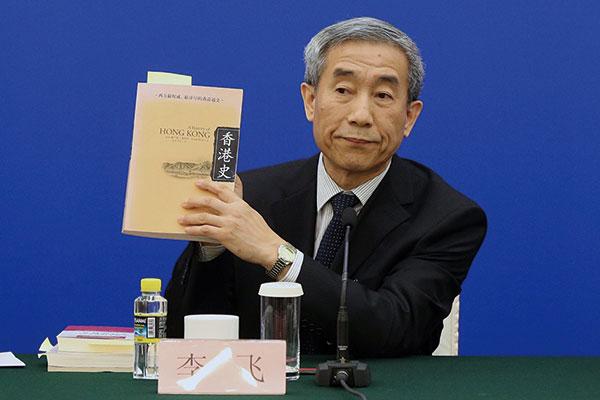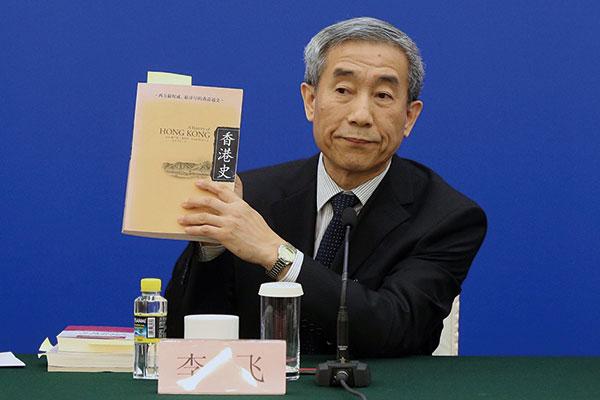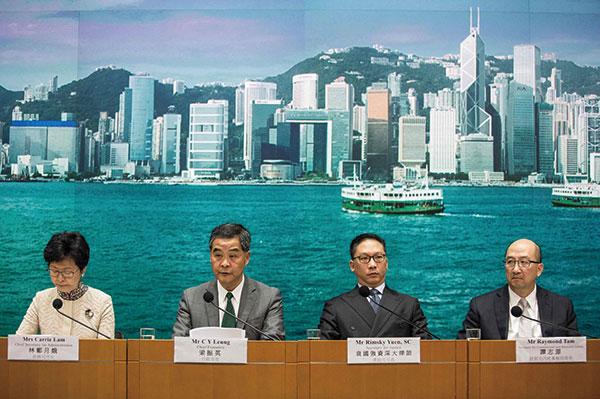fter four candidates that advocate self-determination or even full independence for Hong Kong were elected as lawmakers in the Hong Kong Legislative Council (LegCo) election held in September, all eyes were on the swearing-in ceremony in which elected lawmakers are required to take an oath before taking office, in accordance with Hong Kong’s Basic Law, the city’s mini-constitution.
According to Article 104 of the Basic Law, the official 77-word oath requires legislators to swear to uphold Hong Kong’s Basic Law and “swear allegiance to the Hong Kong Special Administrative Region of the People’s Republic of China.”
Anti-Chinese Slurs
As pro-independence sentiments have been on the rise in Hong Kong in the last couple of years, Beijing has long considered the oath-taking a symbolic event that highlights China’s sovereignty and authority over Hong Kong. For the very same reason, some Hong Kong’s pro-democracy lawmakers, who have become increasingly sympathetic to the independence movement, have also used the ceremony as a platform to express their protests against Beijing’s authority. In the past, lawmakers have added new phrases to the oath, carried banners with political slogans or chanted anti-Beijing slogans before or after taking the oath.
This year, the lawmakers in question adopted similar tactics. Roy Kwong Chun-yu, a Democratic Party lawmaker added “Hong Kong is the home ground of Hongkongers” and “I want genuine universal suffrage” to the oath. Cheng Chung-tai from Civic Passion said he would fight to “rewrite the constitution by the people” after taking the oath. Leung Kwok-hung, another localist lawmaker called for “civil disobedience” while holding a yellow umbrella, a symbol of the Occupy movement of 2014. Lau Siu-lai, yet another localist lawmaker, resorted to reading the 77-word oath in slow-motion, pausing for five seconds after each word and taking 10 minutes to finish it.
However, two of the lawmakers took their protest to another level. While holding a “Hong Kong is not China” banner and saying that we pledge allegiance to the “Hong Kong nation” in her first attempt at taking the oath, Yau Wai-ching, a 25-year-old from the newly-formed Youngspiration party then changed “People’s Republic of China” into “People’s Refucking of Cheena” when taking the oath. Yau’s Youngspiration colleague, 30-year-old ‘Baggio’ Sixtus Leung Chun-hang, held a similar flag and took a similar oath that also incorporated “Cheena.”
“Cheena” (or “Zhina”) is a term originating from translations of ancient Sanskrit texts for referring to China. Although the term was deemed neutral in ancient times, it became a racial slur after Japan adopted the term to refer to China in a derogatory way during its invasion of the country in the early 1930s and during WWII. The term is considered so offensive that the post-war Japanese government banned the term in any official publications at the request of the government of the then Republic of China’s in 1946.
In the end, the oath-taking of three newly elected lawmakers (Yau, Leung and Lau) was deemed invalid by Andrew Leung Kwan-yuen, the President of the Legislative Council, though Leung allowed them to retake their oaths at a later time.
The decision, along with the two lawmakers’ racially-charged language, immediately drew protest from both the Hong Kong government and the Hong Kong public. It is estimated that 94 percent of Hong Kong people are ethnic Chinese. Despite the rising pro-independence sentiment, particularly among the younger generation, with localist groups winning some 20 percent of the votes in the LegCo election, Yau Wai-ching and Leung Chung-hang’s racially-charged language was widely condemned.
An internet petition demanding the pair apologize and resign attracted 94,000 replies in four days and several protests were organized during the following weeks to protest against the lawmakers’ racial slur against China. The largest of these protests was the one held in the public square outside the LegCo complex on October 25, attended by more than 8,000 people according to the police, with many holding banners calling the lawmakers “traitors” and “scum.”
Hong Kong’s Chief Executive Leung Chun-ying and Justice Secretary Rimsky Yuen Kwok-keung also mounted a legal challenge on Hong Kong’s High Court to disqualify Yau and Cheung on the grounds of contravening the Basic Law. While the court agreed to review the case, it rejected Hong Kong government’s request to bar the pair from retaking their oaths.
Failing to stop the re-swearing-in ceremony, the pro-establishment camp then tried another strategy, staging a protest walkout when the lawmakers in question were about to retake their oath as the ceremony was held on October 19, effectively preventing them from being sworn in.
In response, Cheng Chung-tai, another localist lawmaker turned the Chinese and Hong Kong flags on the desks of the pro-establishment lawmakers upside down twice, before being expelled by Leung, the LegCo president. Leung later announced that he would postpone the swearing-in ceremony for the two lawmakers until the High Court made its decision on the case, while allowing the other lawmaker Lau Siu-lai, who read the oath in slow motion, but had not used abusive language, to retake the oath.
A week after, on October 26, the confrontation between the pro-democracy and pro-establishment camp in the LegCo escalated, when Youngspiration’s Yau and Leung stormed the LegCo chamber in an attempt to complete their oath taking. As the duo rushed to the center of the room to read out the oath, security guards tried to remove them while other pro-democracy lawmakers rushed to their defense, and physically clashed with security guards and pro-establishment lawmakers. In the following commotion, four guards were injured.

 Old Version
Old Version

